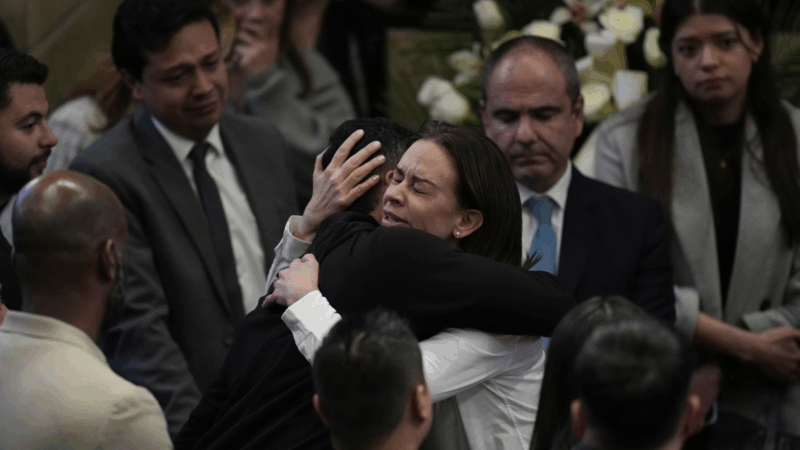Colombian senator and presidential hopeful dies 2 months after shooting
BOGOTA, Colombia — A Colombian senator and presidential hopeful whose shooting at a political rally in June recalled some of the darkest chapters of the country’s drug-fueled violence died Monday.
The family of Miguel Uribe Turbay said the politician died at a hospital in the capital, Bogota. Uribe, 39, was shot three times, twice in the head, while giving a campaign speech in a park and had since remained in an intensive care unit in serious condition with episodes of slight improvement.
“Rest in peace, love of my life. I will take care of our children,” his wife, María Claudia Tarazona, wrote in a social media post confirming his death. “I ask God to show me the way to learn to live without you.”
A teenage suspect was arrested at the scene of the June 7 attack in a working-class Bogota neighborhood. Authorities later detained several other people, but they have not determined who ordered the hit or why.
The shooting, which was caught on multiple videos, alarmed Colombians who have not seen this kind of political violence against presidential candidates since Medellin drug lord Pablo Escobar declared war on the state in the 1990s.
Uribe’s own mother, well-known journalist Diana Turbay, was among the victims of that period. She died during a police rescue after being kidnapped by a group of drug traffickers led by Escobar seeking to block their extradition to the United States.
“If my mother was willing to give her life for a cause, how could I not do the same in life and in politics?” Uribe, who was just 5 when his mother was killed, said in an interview last year with a Colombian news outlet.
Uribe, a lawyer with a masters degree in public administration from Harvard University, entered politics as a councilman for Bogota when he was 26. In 2022, he was the biggest vote-getter in the conservative Democratic Center party led by former President Álvaro Uribe.
“Evil destroys everything,” the ex-president, who is not related to the senator, said on social media. “They have killed hope. May Miguel’s struggle be a light that illuminates Colombia’s path.”
The senator was among the strongest critics of Colombia’s current government. In October, he joined the list of politicians seeking to replace Gustavo Petro, the first leftist to govern Colombia, in the May 2026 elections.
Authorities have floated several hypotheses about what led to the attack, while allies of the candidate have complained that the government ignored repeated requests to reinforce his state-provided security detail.
Petro took to X to offer condolences to Uribe’s family and stress that the “investigation must be furthered.”
“The government must repudiate the crime and help,” Petro wrote. “Regardless of ideology, the person and their family, their life and safety, are the government’s priority. We have not persecuted any member of the opposition, nor will we.”
In the immediate aftermath of the attack, tens of thousands of people dressed in white and waving Colombian flags took to the streets to reject the violence.
U.S. Secretary of State Marco Rubio was among the foreign politicians who lamented the senator’s death.
“The United States stands in solidarity with his family, the Colombian people, both in mourning and demanding justice for those responsible,” he posted on X.
By declaring his aspirations to higher office, Uribe sought to become the country’s youngest president, although he was not on the list of favorites in the early stages of the race when he was shot. The shooting prompted the government to strengthen security for all opposition politicians and presidential hopefuls, some of whom called off political rallies for fear of being attacked.
Javier Garay, a political science professor at the Externado University of Colombia, said Uribe has already “become a symbol of the Colombian right.” However, he considered it premature to predict whether the senator’s death will strengthen the political faction, given the current lack of unity and diverse proposals from dozens of politicians vying to represent the bloc on next year’s ballot.
____
Associated Press writer Regina Garcia Cano contributed from Mexico City.
___
Follow AP’s coverage of Latin America and the Caribbean at https://apnews.com/hub/latin-america
In Vermont, small town meetings grapple with debate on big issues
Typically concerned with local issues, residents at town meetings in Vermont and elsewhere increasingly use the forum to debate polarizing national and international events.
Alabama man, on death row since 1990, to get new trial
The U.S. Supreme Court on Monday declined to review the summer ruling from the 11th U.S. Circuit Court of Appeals. The decision paves the way for Michael Sockwell to receive a new trial.
Supreme Court blocks redrawing of New York congressional map, dealing a win for GOP
At issue is the mid-term redrawing of New York's 11th congressional district, including Staten Island and a small part of Brooklyn.
U.S. states take steps to guard against any potential threat from Iran
Iran has made prior attempts to launch terrorist attacks on U.S. soil, but all have been thwarted in recent years. States are bracing for a heightened threat after the war.
Video of Clinton depositions in Epstein investigation released by House Republicans
Over hours of testimony, the Clintons both denied knowledge of Epstein's crimes prior to his pleading guilty in 2008 to state charges in Florida for soliciting prostitution from an underage girl.
Some Middle East flights resume, but thousands of travelers are still stranded by war
Limited flights out of the Middle East resumed on Monday. But hundreds of thousands of travelers are still stranded in the region after attacks on Iran by the U.S. and Israel.






